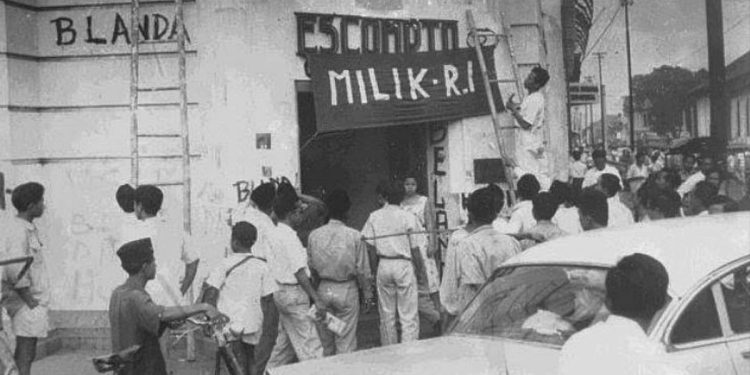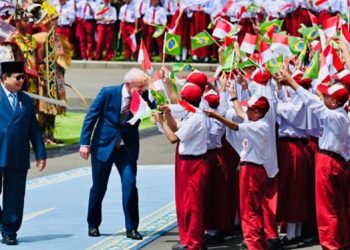Jakarta, Indonesia Sentinel — Walkouts, or labor strikes, have played a pivotal role in shaping Indonesia’s labor movements and the broader social landscape. From the era of Dutch colonial rule to the post-independence period, workers have used walkouts as a form of resistance to oppressive working conditions and unjust policies. This article explores the walkouts history in Indonesia, examining their significance in the fight for workers’ rights and the socio-political changes they have catalyzed.
Colonial Era: The Struggles Begin

During the Dutch colonial period, Indonesian workers faced harsh conditions, with long working hours, low wages, and poor treatment by their employers. It was in this context that the first significant walkouts took place. One notable example is the 1919 strike led by Soerjopranoto, which took place in Yogyakarta. The strike, which involved thousands of workers, was a response to the oppressive conditions of labor under the colonial regime. It was one of the first organized demonstrations that showcased the power of collective action, setting the stage for future labor movements in Indonesia.
This era also saw the rise of worker organizations, although they were often suppressed by the colonial authorities. However, the seeds of labor activism were sown, and these early movements laid the foundation for more substantial labor strikes in the years to come.
Walkouts History Post-Independence: A New Struggle
After Indonesia gained independence in 1945, the labor movement continued to evolve, reflecting the broader socio-political changes in the country. The first major walkout after independence took place in 1948 in Delanggu, Central Java, where more than 15,000 workers went on strike due to poor working conditions and wage cuts. This strike was a significant moment in Indonesia’s post-colonial labor history, marking the beginning of large-scale labor protests aimed at improving workers’ rights.
Despite the challenges of rebuilding the nation, the labor movement gained momentum in the 1950s and 1960s, as workers began to demand better wages, working conditions, and social services. However, the political instability during this period led to tensions between labor unions and the government.
Walkouts History The New Order: Limited Freedom but Growing Discontent

Under President Suharto’s New Order regime, labor movements were heavily restricted, and the government imposed tight controls on trade unions. Strikes became less common, and many labor leaders were silenced or arrested. Despite this, the 1990s saw a resurgence of labor unrest, particularly during the Asian financial crisis. In 1998, the political and economic turmoil led to widespread strikes, with workers demanding not only economic reforms but also political changes. This period of unrest culminated in the resignation of Suharto and the beginning of Indonesia’s reform era.
Labor strikes during this period were pivotal in the shift toward a more democratic Indonesia, as workers joined forces with student movements and other civil society groups to push for greater political freedoms and social justice.
Walkouts History The Reform Era: Labor’s Resurgence
After the fall of Suharto’s regime, Indonesia entered a period of reform, during which workers were once again able to organize more freely. The early 2000s saw an increase in labor strikes, with many workers demanding fair wages, better working conditions, and stronger social safety nets. One of the most significant strikes in recent history occurred in 2012, when over 2 million workers participated in a nationwide walkout, protesting low wages and poor working conditions. The strike highlighted the growing frustration among workers, especially in the manufacturing sector, with the slow pace of labor reforms.
The reform era has also seen significant changes in labor law, including the introduction of minimum wage laws and better protection for workers’ rights. However, challenges remain, as many workers still face low wages and precarious working conditions, and labor unions continue to advocate for improved social protections and greater economic opportunities.
Social and Economic Impact of Walkouts
Walkouts in Indonesia have had a significant impact on both the social and economic landscape of the country. On one hand, they have played a crucial role in bringing attention to the plight of workers and pushing for reforms that have led to improvements in wages, working conditions, and social protections. On the other hand, strikes can also have negative economic consequences, such as disruptions to production, loss of revenue for companies, and broader economic instability.
Despite these challenges, walkouts continue to be a powerful tool for workers in Indonesia to fight for their rights. In a country with a large and growing workforce, labor movements and walkouts remain an essential mechanism for pushing for change.
Sangmong: The Cultural and Historical Significance of the Bali Tiger
Challenges in the Labor Movement
While walkouts have been a significant force for change in Indonesia, they are not without challenges. Workers often face retaliation from employers, including job loss and harassment, for participating in strikes. Additionally, globalization and changes in the global economy have complicated labor relations, with many companies outsourcing jobs to countries with lower labor costs, undermining labor unions’ bargaining power.
As Indonesia continues to develop economically, it will be important to balance the needs of workers with the demands of an increasingly globalized economy. Labor movements will need to continue advocating for workers’ rights while navigating the changing landscape of the modern workforce.
Conclusion
The history of walkouts in Indonesia is a testament to the resilience and determination of workers fighting for better wages, improved working conditions, and social justice. From the colonial era to the present, labor strikes have played a crucial role in shaping the country’s political and economic development. While challenges remain, the ongoing efforts of labor unions and workers continue to push for a more just and equitable society in Indonesia.
As the country moves forward, the legacy of these walkouts serves as an important reminder of the power of collective action in the fight for workers’ rights and the broader struggle for social change.
(Becky)
























